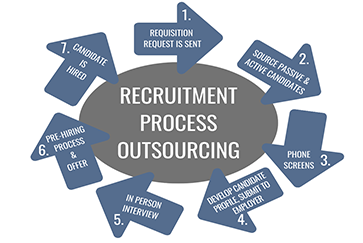What is RPO?
RPO can be understood as a specialised subset of BPO, where a business outsources its recruitment process – in part or entirety – to a third-party expert or a service provider. This third-party expert acts on behalf of the company to maximise the efficiency and ROI of the hiring process. An RPO service provider assumes more responsibility than a recruitment firm in the design, management and results of the recruitment process.
How does RPO work?
From in-house recruiting to a staffing agency, the hiring processes of companies have come a long way. And at the top of this chain is the RPO solution.
In the RPO model, a consulting team works with the company to understand their hiring needs and architect a solution based on it. The RPO team then takes ownership of a part of or the entire recruitment process in generating and qualifying candidates, filling current roles and, possibly, managing the future needs.
Why is RPO important?
Most leaders worry about outsourcing such a critical function to an external party. But the following reasons explain why businesses need RPO services for their survival:
- With clearly mapped strategies, RPO prevents bad hiring decisions, bringing more stability and effectiveness to the process.
- RPO offloads the hiring responsibility from your HR teams’ shoulders and allows them to work on vital day-to-day tasks.
- RPO partners with the company and works as an extension of the internal team. They are just as invested as any other member of the organisation in onboarding the right people.
- RPO providers come up with talent acquisition strategies that give businesses an edge over their competitors.
What are the common RPO models?
RPO isn’t a “one-size-fits-all” hiring solution. Based on the needs of the company, there are several models that RPO providers offer:
- On-demand model
In this model, the company has a sudden and immediate hiring need. With RPO providers already in line with the organisation’s processes, they are able to fulfil these requirements accurately and in a timely manner, saving them a lot of time and money.
- Function-based model
The company that opts for this model outsources the hiring for a particular division or a project to an RPO provider. The other hiring needs are taken care of by the internal recruitment team.
- Full RPO
This model is a little different; wherein the company outsources all the hiring strategies, processes and decisions to the RPO provider. Here, the RPO provider practically serves as an internal recruiting team.
What do the RPO services include?
The above models can cover one or more of the below services:
- Workforce planning
Perfect to forecast short-term and long-term hiring needs
- Hiring manager engagement
Improves channels of communication between a hiring manager and the account teams
- Strategic sourcing
Helps to identify the platforms where high-performing candidates are available
- Pre-employment screening
Conduct thorough background checks, employment history and other records of the candidates
- Early careers or graduate recruitment
Can be used to develop outreach programmes for graduates, internships, vacation schemes, apprenticeships and more
- Talent engagement
Aids in positioning the company and its culture such that they can acquire the right talent
- Candidate management
Delivers an efficient end-to-end experience starting from targeting the candidate to their onboarding
- Recruitment analytics support
Helps to develop checklists and processes to measure and identify the metrics of the recruitment process
- Compliance and risk management
Needed to ensure that all processes and operations of recruitment are legal, ethical and in line with regulations.
What are the key stages of RPO?
- Scalable solutions – RPO works on the principle of a scalable and flexible solution where a business has to pay only for what they need when they need it.
- Reduced time & cost to hire – RPO providers follow strict timelines to meet the recruitment needs. Further, in the long run, RPO can offer a minimum of a 30% reduction in the cost-per-hire.
- Quality of hire – RPO providers design and follow extensive protocols to ensure hiring those people who meet the organisational needs, not just on paper, but also in practice.
- Analytics and reporting – RPO providers measure, analyse and highlight the insights from every stage of the process to allow for effective decision-making.
What are the benefits of RPO?
- Scalable solutions – RPO works on the principle of a scalable and flexible solution where a business has to pay only for what they need when they need it.
- Reduced time & cost to hire – RPO providers follow strict timelines to meet the recruitment needs. Further, in the long run, RPO can offer a minimum of a 30% reduction in the cost-per-hire.
- Quality of hire – RPO providers design and follow extensive protocols to ensure hiring those people who meet the organisational needs, not just on paper, but also in practice.
- Analytics and reporting – RPO providers measure, analyse and highlight the insights from every stage of the process to allow for effective decision-making.
